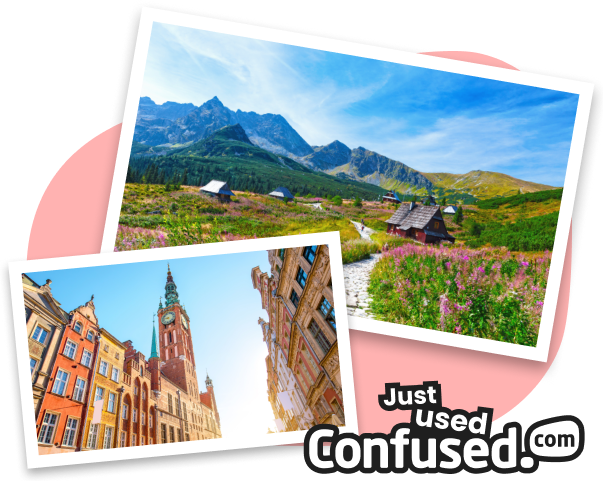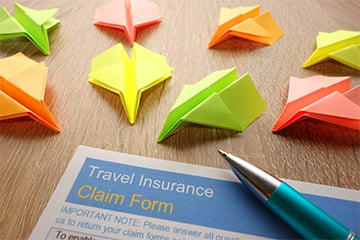Do I need travel insurance for Poland?
Travel insurance isn't a legal requirement if you're travelling to Poland. But it's still worth considering as it can offer you financial protection if something goes wrong - giving you peace of mind.
As Poland is in the Schengen Area, you can stay for up to 90 days in a 180 day period without a visa. But if you're planning on staying longer, you'll need a visa. A travel insurance policy is a requirement of this visa - this applies to any country in the Schengen Area.
Important information
All insurance products exclude cover for known events. These are global events that can put you in danger and/or disrupt travel. This exclusion applies if the event was declared as a 'known event' when you bought your travel insurance.
Russian military strikes have also taken place in Ukraine within 20km of the Polish border. Access to the border between Poland and Ukraine is restricted due to the ongoing conflict between Russia and Ukraine1.
If you travel against government advice, you won't be covered by any travel insurance you buy.
1Correct as of February 2025
What types of travel insurance can I get for Poland?
Tailor your travel insurance to your trip to Poland
Standard travel insurance can provide you with essential cover, but it doesn't offer protection for certain activities and trips.
Winter sports insurance
Though Poland isn't widely known as a skiing or snowboarding destination, there are numerous ski resorts in southern areas around the Tatra Mountains including Kasprowy Wierch. More importantly, you'll be able to hit the pistes at a fraction of the cost of popular resorts in countries like France and Austria.
Standard travel insurance usually does not cover winter sports because of the risk involved. Buying additional winter sports cover can protect you from alpine related issues such as losing your ski pass or if you ever need mountain rescue.
Cruise cover
Gdynia and Gdansk are Poland’s two main cruise ports on the northern coast. If you're booking a Baltic itinerary, cruise lines big and small stop at these ports. Some standard travel insurance policies include cruise cover, but this can sometimes be on a basic level.
Cruise travel insurance can offer extra protection for the unique risks associated with going on a cruise. Your insurance can cover:
-
Cabin confinement due to illness or bad weather
-
Unused excursions
-
Having to be airlifted to hospital
You can opt for a specialist cruise travel insurance policy, but you can also get it as an add-on with a standard policy. Typically this costs extra.
Business cover
If you're travelling to Poland for business purposes, you might consider business travel insurance. This type of cover can offer all the elements of a standard insurance policy, such as emergency medical treatment.
But crucially, business travel insurance can also offer specialist cover for things like company cash and expensive business equipment.
Gadget cover
Not all travel insurance policies cover gadgets as standard, even if they do - you'll have single item and total cover limits. This means if you need to claim, you can only do so up to a set amount. If you're taking high spec gadgets, your cover limit may not be nearly enough to replace them if they’re lost, damaged or stolen.
Gadget cover is available as a policy add-on or a standalone policy. Exactly what gadgets are covered can vary between insurance providers, there could also be a limit on how many gadgets your policy covers. So it's important to check over the policy you choose before buying.
What does Poland travel insurance cover?
Here's what's typically included on a travel insurance policy for Poland:
-
Medical cover: A Global Health Insurance Card (GHIC) entitles you to state level medical care, but any further medical treatment costs might not be covered by it. That's where your travel insurance can help.
-
Repatriation cover: If you need to return to the UK for emergency medical treatment, or in the event of death - associated costs are covered by travel insurance.
-
Baggage cover: Nothing can make your heart sink like losing your luggage, but travel insurance can reimburse you if your belongings are lost, stolen or damaged.
-
Travel disruption insurance: If your flight is cancelled because of strikes or mechanical breakdown for example, your travel insurance can cover your extra expenses.
-
Cancellation and curtailment cover: You'll be financially protected from the costs of getting home, or finding alternative accommodation if something happens on your trip. For example, if your hotel is flooded and has to close. It can also cover you if you need to cancel your holiday due to medical conditions or bereavement.
What doesn't it cover?
Always best to check policy details, but here's what's normally excluded:
-
Pre-existing medical conditions: You must declare any medical conditions to your insurer. If you don't, your insurer could void your policy and you won't be able to claim for any medical care you need.
-
Injury or illness resulting from illegal behaviour or the use of drugs or alcohol: If you injure yourself or lose belongings because you were under the influence, your insurance won't cover this.
-
Changing your mind and deciding you no longer want to travel: You can't claim if you simply decide against travelling. This is also the case if you don't leave yourself enough time to catch a flight, for example.
-
Travelling against FCDO advice: The FCDO set out advice and warnings about travelling abroad. If you're advised against travel to certain parts of Poland and you ignore the advice, you won't be covered for anything that happens to you.
-
Known events: These aren't always covered as standard on travel insurance policies. Have a look at your policy documents to check whether they're covered.
Travel tips for Poland
-
Language: Polish is the official language of the country. German, Ukrainian and Belarusian are also spoken by a minority of the population. It's common for people in Poland to be able to speak English, but you shouldn't assume it's widely spoken during your travels.
-
Driving: You can drive in Poland on a UK licence for up to 6 months, but there are a few things to be aware of if you're taking your own car. For example, you must carry a certificate of motor insurance and your V5 registration document. Your vehicle must also have a UK identifier within the number plate. If it doesn't, you're required to display a UK sticker.
-
Currency: The Polish złoty is the official currency and legal tender of Poland. It's widely available in currency exchange outlets in the UK.
-
Rules and laws: There are some laws you should be aware of. Jaywalking (crossing the street not at a designated crossing) is illegal and can result in a fine. It's also illegal to drink alcohol in public places. You must also wear reflective clothing in non-built up areas at night - you can be fined for not doing so.
-
British embassy: It's located in Warsaw and can offer emergency help if needed. The FCDO can also help while abroad.
-
Safety: Poland shares a border with Ukraine. There are currently restrictions around some parts of the border due to the ongoing Russian invasion of Ukraine.
Enjoy your trip knowing you're covered
Need more help with your trip to Poland?
Our service is free and compares a wide range of trusted household names. Confused.com is an intermediary and receives commission from theidol.com if you decide to buy through our website which is based on a percentage of the total annual premium. We pride ourselves on impartiality and independence – therefore we don't promote any one insurance provider over another.









